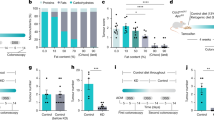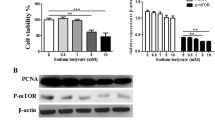Abstract
PURPOSE: Crypt surface hyperproliferation is an intermediate biomarker of colon cancer risk.In vitro studies indicate that the short-chain fatty acid and antineoplastic agent butyrate may reverse the crypt surface hyperproliferation induced by the secondary bile acid and tumor promoter, deoxycholate. We hypothesized that butyrate may reverse deoxycholate-induced crypt surface proliferation in vivo.METHODS: Thirty-one Sprague-Dawley rats (250–300 g) underwent surgical isolation of the colon and 24-hour luminal instillation of either sodium chloride, butyrate, deoxycholate, or butyrate plus deoxycholate (all solutions, 2 ml; pH 7; total sodium = 20 mM). Study variables included colon weight, mucosal DNA, mucosal protein, and proliferating cell nuclear antigen immunohistochemistry, labeling of which was determined in five crypt compartments from base to surface (12 crypts per rat). Labeling indexes were calculated as proliferating cell nuclear antigen immunohistochemistry-labeled cells divided by total counted cells in the whole colonic crypt and each of five crypt compartments. The Φ oh value (an index of premalignant risk) was calculated as the ratio of labeled cells in the two surface compartments divided by the total labeled cells. RESULTS: Deoxycholate significantly increased colon wet weight, mucosal protein, total crypt labeling indexes, crypt surface labeling indexes, and the Φ oh value and raised the mucosal DNA content. Butyrate alone slightly reduced total mucosal DNA and protein content. The combination of butyrate plus deoxycholate significantly decreased mucosal DNA and tended to reduce mucosal protein compared with deoxycholate alone. In contrast to prior in vitro findings, butyrate plus deoxycholate did not reverse the deoxycholate-induced surface hyperproliferative changes as measured by proliferating cell nuclear antigen labeling. CONCLUSIONS: Because co-treatment with butyrate plus deoxycholate inhibits deoxycholate-induced increases in total mucosal DNA and protein content, we conclude that butyrate may play a role in maintaining the proliferative balance of the colonic mucosa,in vivo.However, co-treatment with butyrate plus deoxycholate does not reverse the deoxycholate induced increases in colon weight and proliferating cell nuclear antigen labeling indexes under the studied experimental conditions.
Similar content being viewed by others
References
Howe GR, Benito E, Castelleto R,et al. Dietary intake of fiber and decreased risk of cancers of the colon and rectum: evidence from the combined analysis of 13 case-control studies. J Natl Cancer Inst 1992;84:1887–96.
Yu H, Harris RE, Gao YT, Gao R, Wynder EL. Comparative epidemiology of cancers of the colon, rectum, prostate and breast in Shanghai, Chinaversus the United States. Int J Epidemiol1991;20:76–81.
McIntyre A, Gibson PR, Young GP. Butyrate production from dietary fibre and protection against large bowel cancer in a rat model. Gut 1993;34:386–91.
DeCosse JJ, Miller HH, Lesser ML. Effect of wheat fiber and vitamins Cand E on rectal polyps in patients with familial adenopolyposis. J Natl Cancer Inst 1989;81:1290–7.
Young GP, McIntyre A, Albert V, Folino M, Muir JG, Gibson PR. Wheat bran suppresses potato starch potentiated colorectal tumorigenesis at the aberrant crypt stage in a rat model. Gastroenterology 1996;110:508–14.
Reddy BS, Weisburger JH, Wynder EL. Colon cancer: bile salts as tumor promoters. In: Salga TJ, Sivak A, Boutwell RK, eds. Carcinogenesis. New York: Raven Press, 1978:453–64.
Hill MJ, Melville DM, Lennard-Jones JE, Neale K, Ritchie JK. Faecal bile acids, dysplasia, and carcinoma in ulcerative colitis. Lancet 1987;2:185–6.
Hill MJ. Bile acids and colorectal cancer: hypothesis. Eur J Cancer Prev 1991;1(Suppl 2):9–72.
Velázquez OC, Rombeau JL. Butyrate and the colonocyte: implications for neoplasia. Dig Dis Sci 1996;41:727–39.
Velázquez OC, Jabbar A, DeMatteo RP, Rombeau JL. Butyrate inhibits hepatic tumor growthin vivo, in a murine model of colorectal carcinoma metastatic to the liver. Surgery 1996;120:440–8.
Bayerdorffer E, Mannes GA, Richter WO,et al. Increased serum deoxycholic acid levels in men with colorectal adenomas. Gastroenterology 1993;104:145–51.
Lipkin M, Enker W, Winawer SJ. Tritiated-thymidine labeling of rectal epithelial cells in ‘non-prep’ biopsies of individuals at increased risk for colonic neoplasia. Cancer Lett 1987;37:153–61.
Pandey S, Gordon PH, Wang E. Expression of proliferation-specific genes in the mucosa adjacent to colon carcinoma. Dis Colon Rectum 1995;38:462–7.
Lipkin M, Blattner WE, Fraumeni JF, Lynch HT, Deschner E, Winawer S. Tritiated thymidine (Φ p,Φ h) labeling distribution as a marker for hereditary predisposition to colon cancer. Cancer Res 1983;43:1899–904.
Deschner EE, Maskens AP. Significance of the labeling index and labeling distribution as kinetic parameters in colorectal mucosa of cancer patients and DMH treated animals. Cancer 1982;50:1136–41.
Bartram H-P, Englert S, Scheppach W,et al. Antagonistic effects of deoxycholic acid and butyrate on epithelial cell proliferation in the proximal and distal human colon. Z Gastroenterol 1994;32:389–92.
Velázquez OC, Zhou D, Seto RW,et al.In vivo crypt surface hyperproliferation is decreased by butyrate and increased by deoxycholate in normal rat colon: associatedin vivo effects on c-Fos and c-Jun expression. JPEN 1996;20:243–50.
Bartram H-P, Scheppach W, Schmid H,et al. Proliferation of human colonic mucosa as an intermediate biomarker of carcinogenesis: effects of butyrate, deoxycholate, calcium, ammonia, and pH. Cancer Res 1993;53:3283–8.
Lowry OH, Rosebrough NJ, Farr AL,et al. Protein measurement with the folin phenol reagent. J Biol Chem 1951;193:265–75.
Peterson GL. Review of the folin phenol protein quantitation method of Lowry, Rosebrough, Farr, and Randall. Anal Biochem 1979;100:201–20.
Burton K. A study of the conditions and mechanism of the diphenylamine reaction for the colorimetric estimation of deoxyribonucleic acid. Biochem J 1956;62:315–23.
Giles KW, Myers A. An improved diphenylamine method for the estimation of deoxyribonucleic acid [letter]. Nature 1965;206:93.
Welberg JW, deVries EG, Hardonk MJ,et al. Proliferation rate of colonic mucosa in normal subjects and patients with colonic neoplasms: a refined immunohis-tochemical method. J Clin Pathol 1990;43:453–6.
Kubben FJ, Peeters-Haesevoets A, Engels LG,et al. Proliferating cell nuclear antigen (PCNA)—a new marker to study human colonic cell proliferation. Gut 1994;35:530–5.
Yamashita N, Minamoto T, Onda M, Esumi H. Increased cell proliferation of azoxymethane-induced aberrant crypt foci of rat colon. Jpn J Cancer Res 1994;85:692–8.
Scheppach W, Bartram H-P, Richter A,et al. Effect of short-chain fatty acids on the human colonic mucosain vitro. JPEN 1992;16:43–8.
Thurnherr N, Deschner EE, Stonehill EH, Lipkin M. Induction of adenocarcinomas of the colon in mice by weekly injection of 1,2-demethylhydrazine. Cancer Res 1973;33:940–5.
DeRubertis FR, Craven PA. Relationship of bile salt stimulation of colonic epithelial phospholipid turnover and proliferative activity: role of activation of protein kinase C. Prev Med 1987;16:572–9.
Guillem JG, O'Brian CA, Fitzer CJ,et al. Studies on protein kinase C and colon carcinogenesis. Arch Surg 1987;122:1475–8.
Toscani A, Soprano DR, Soprano KJ. Molecular analysis of sodium butyrate-induced growth arrest. Oncogene Res 1988;3:223–38.
Whitehead RH, Young GP, Bhathal PS. Effects of short chain fatty acids on a new human colon carcinoma cell line (LIM1215). Gut 1986;27:1457–63.
Souleimani A, Asselin C. Regulation of C-fos expression by sodium butyrate in the human colon carcinoma cell line Caco-2. Biochem Biophys Res Commun 1993;193:330–6.
Kruh J. Effects of sodium butyrate, a new pharmacological agent, on cells in culture. Mol Cell Biochem 1982;42:65–82.
Tang SJ, Huang YM, Wang FF. Analysis of c-fos expression in the butyrate-induced F-98 glioma cell differentiation. Biochem J 1995;306:47–56.
Nishina Y, Sumi T, Souichi A, Kosaka M, Nishimune Y. The induction of jun genes during the reversible changes induced with sodium butyrate on the differentiation of F9 cells. Exp Cell Res 1993;208:492–7.
Boffa LC, Lupton JR, Mariani MR,et al. Modulation of colonic epithelial cell proliferation, histone acetylation, and luminal short chain fatty acids by variation of dietary fiber (wheat bran) in rats. Cancer Res 1992;52:5906–12.
Reddy BS, Engle A, Simi B, Goldman N. Effect of dietary fiber on colonic bacterial enzymes and bile acids in relation to colon cancer. Gastroenterology 1992;102:1475–82.
Author information
Authors and Affiliations
Additional information
Supported by National Institutes of Health Surgical Oncology Research Training Grant (5T32/CA/096109/08).
Read at the meeting of The American Society of Colon and Rectal Surgeons, Seattle, Washington, June 9 to 14, 1996, and the Tripartite Meeting, London, United Kingdom, July 3 to 10, 1996.
About this article
Cite this article
Velázquez, O.C., Seto, R.W., Choi, J. et al. Butyrate inhibits deoxycholate induced increase in colonic mucosal DNA and protein synthesisIn Vivo . Dis Colon Rectum 40, 1368–1375 (1997). https://doi.org/10.1007/BF02050825
Issue Date:
DOI: https://doi.org/10.1007/BF02050825




